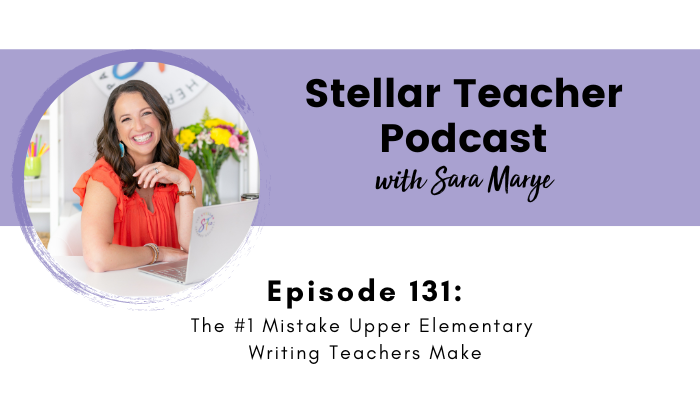
Click play below to hear the #1 writing mistake teachers make:
If you’re a longtime listener of the podcast, you know that the majority of my episodes revolve around reading content. But being a literacy expert is more than just reading; it also involves writing content. I get asked a lot of writing questions, so I’ve decided to dedicate more episodes and resources to feature information regarding writing. That starts with today’s episode, in which I share the #1 writing mistake upper elementary teachers make.
This writing mistake is something that a lot of teachers make, me included, due to the pressure and expectations of end of the year state tests. With wanting a polished and complete essay, teachers tend to skip establishing a basic writing foundation, which actually is the most important aspect of a students’ ability to write an essay. In the episode, I ask teachers to have students focus on two things, which will greatly enhance their writing skills.
We know that reading is essential if you want to be successful in life, but so is writing. It’s also known that students struggle with writing, even with a basic foundation. Therefore, keeping those ideas in mind, it’s essential to avoid this critical writing mistake with your students in order for them to be successful writers in the future.
Want more information and resources to help you with your writing content and instruction? Sign up for my private podcast, the Confident Writer Systems Series that will give you practical and actionable steps to building a strong writing foundation for your students.
I’ve also revamped my reading membership to include writing resources for upper elementary literacy teachers, so I’ve renamed the membership to the Stellar Literacy Collective! Sign up to get exclusive content for the 2023-2024 school year.
In this episode on the #1 writing mistake, I share:
- Ways to build a student‘s confidence with writing
- Why foundational writing skills are essential to student success
- Two action items to do at the end of this episode
- Why teachers make the mistake and what to do instead
- Information about a free gift to my listeners and membership revamp
Resources:
- Sign up for my Private Podcast: Confident Writer Systems Series
- Join the waitlist for the Stellar Literacy Collective Membership
- Check out the Stellar Teacher Reading Membership
- If you’re enjoying this podcast, please leave a review on Apple Podcasts!
Related episodes and blog posts:
- Episode 103, 5 Tips That Help Students Improve in the Area of Writing About Reading
- Episode 101, A Literacy Routine for Building Students’ Sentence Structure Skills
- Episode 51, Fostering a Life-Long Love of Writing in Your Students with Megan Polk
- 5 Highly Effective Sentence Writing Activities
Connect with me:
- Join my newsletter
- Shop my TPT store here
- Instagram: @thestellarteachercompany
More About Stellar Teacher Podcast:
Welcome to the Stellar Teacher Podcast! We believe teaching literacy is a skill. It takes a lot of time, practice, and effort to be good at it. This podcast will show you how to level up your literacy instruction and make a massive impact with your students, all while having a little fun!
Your host, Sara Marye, is a literacy specialist passionate about helping elementary teachers around the world pass on their love of reading to their students. She has over a decade of experience working as a classroom teacher and school administrator. Sara has made it her mission to create high quality no-fluff resources and lesson ideas that are both meaningful and engaging for young readers.
Each week, Sara and her guests will share their knowledge, tips, and tricks so that you can feel confident in your ability to transform your students into life-long readers.
Tune in on your favorite podcast platform: Apple, Google, Amazon, Spotify, Stitcher, and more! If you’re loving this podcast, please rate, review, and follow!
Podcast (stellar-teacher-podcast): Play in new window | Download
Hey there, friend. Happy Monday. And welcome back to another episode of the Stellar Teacher Podcast.
You are in for a real treat, because today, we are talking about a topic that I rarely do podcast episodes on. Yet it is something that I get asked about all the time. Any guesses as to what it might be?
Okay, well, before I reveal today’s topic, let me just encourage you or ask you to listen to this entire podcast episode. Because at the very end, I have a free gift that I want to offer you if you’re an upper elementary literacy teacher. And I also have a very special announcement to make about our membership site for upper elementary teachers. But you have to listen to the whole podcast to get that free gift and hear the special announcement.
Okay, so now that you’ve had plenty of time to think about the topic that we’re going to talk about today, any final guesses as to what it might be? It’s writing.
Here’s the thing, I love all things literacy, I really, really do. I just tend to gravitate my podcast episodes towards reading related topics. I’m an avid reader myself, I loved teaching reading when I was in the classroom, I loved reading aloud to my students, I have my membership site for upper elementary reading teachers. And reading is obviously an essential skill to have if you want to be successful in life, which is why it’s such an important subject that we focus on in elementary school.
But writing is also super important. Writing is just as important as reading and it is just as essential if you want to be successful in life. Yet, I don’t think that writing gets the same amount of attention in classrooms or schools as reading does. And if you look at my podcast as an example, I rarely talk about writing. Yet I talk about reading all of the time.
But I know that teachers feel confused and under supported and unsure of how to help their students with writing. And at the same time, I also know that students in upper elementary are struggling with writing. I experienced it firsthand when I was in the classroom, my students struggled, I always had students that struggled.
And students struggle with the basics. They struggle with things like sentence writing, and paragraph writing. And I know these things, because of the questions that I get from you. In fact these might have been some of your questions.
Questions like, “Help, my students can’t write in complete sentences, and I don’t know how to help them.” Or “my students have to write a four paragraph essay by the end of the year. But they can’t write a decent paragraph. I’m not sure what I should focus on.” Or “how can I help my students write a meaty paragraph?” I love that question, by the way.
Or other questions that I get are things like we don’t have a writing curriculum, but my students struggle with writing any ideas on how I can help them? And whenever I get questions from you, whether it’s in response to a survey or something that you send me in my Instagram DMS, I really want to figure out how to solve your problems. I mean, that’s kind of my job as a literacy specialist, and just how I serve you guys through this podcast.
I want to solve your problems. And I really wish that I could solve all of your problems, but I do try to figure out ways that I can solve your teacher problems. And anytime that I get multiple questions that are on a related topic, I really start to think about how can I create resources or training to help you? Because if multiple teachers are asking questions about the same thing, this has to be something that we need to address and need to work on.
So with this influx of writing related questions that I’ve been getting lately, it has given me a ton of ideas for writing related podcast episodes, as well as resources and trainings and other things to share with you all. But it also gave me an idea for how to revamp and rebrand our membership site, which I’m going to talk about at the end. So make sure you stick around for that big announcement.
But you guys probably know teaching writing is a challenge. And I think even more challenging is when we try to teach writing well and we try to be really effective in our writing instruction, but it doesn’t have to be. Teaching writing well can be something that all teachers can do.
Now, I’ll be the first to confess that I made plenty of mistakes teaching writing when I was in the classroom. But at the same time, I also did plenty of things really well, I figured out strategies that worked really well and helped my students be successful. And since leaving the classroom, I have also done a ton of research and reading on effective writing instruction. I told you guys, I was an avid reader, I read everything, including professional development books just for the fun of it.
But here’s the good news, there are so many small instructional tweaks that teachers can make, that really will have a huge impact on their students writing output. So small things can have a huge impact. I have ideas, I have strategies, I have systems and routines and resources, and I have things that I think are going to help you become a more confident and more effective writing teacher.
And I will share them with you. In fact, I have put together an entire three week series planned for this summer that is all about writing instruction. And I promise that I’m going to talk about writing more often on the podcast moving forward.
But today, the one thing that I want to share with you is the number one mistake that upper elementary writing teachers make. And I’m going to encourage you once you hear this mistake to stop making the mistake or continue to avoid it, if it’s something that you’re like, Nope, I’m good with that I don’t, I haven’t made that mistake yet. Continued not making it. Okay.
And if you can do this one thing that I’m going to talk about, then you’re going to be well on your way to providing more effective writing lessons with your students. And like I said, the small things, the small adjustments can really have a big impact.
So here it is, the number one mistake that writing teachers make: jumping into essay development before students have mastered paragraph writing, or sentence writing. And this was probably the number one mistake that I made when I taught fourth grade. And I could blame it on the pressure of the STAR test that was our end of year state test that my students had to take.
And my first year teaching fourth grade, all fourth grade students had to write one expository essay, and one narrative essay. So that’s like trying to get our students to write two five paragraph essays by the end of the year. And I think they’ve changed the rules for fourth grade since then. But I was just talking with a third grade teacher from Texas the other day, and she said that now third graders are expected to write a four paragraph essay on the end of your state test.
Talk about pressure, I get it, I’ve been there. And I know that teachers are stressed out about the state tests and the writing demands that states are putting on them. And if your students are expected to write a four or five paragraph essay, by the end of the year, it can feel daunting and overwhelming, and just this idea of how are we going to get them prepared for this expectation.
And I’m sure your initial response is probably, we need to start working on essay development right away. That was my response, at least when I was in the classroom. You know, knowing that my students had the right two full length essays, by the end of the year, really made me feel like my only option was to jump right in and teach my students how to write essays.
And starting in the first week of school or the second week of school, that’s exactly what we did, we would jump right in to essay development. And honestly, I didn’t think too much about this, because I taught fourth grade. And in my head, I was thinking surely, my students have mastered paragraph writing and sentence writing by the time they get to fourth grade. So they should be ready to jump into and start tackling those essays.
So we would start one week, we would do an expository essay, the next week, we would do a narrative essay and back and forth and back and forth. And our focus for the year was on essay development.
So maybe you’re wondering, why is this a mistake? Well, focusing so much on essay development is a mistake for a few reasons. First of all, many students in upper elementary, including my own, struggled to write complete sentences.
And even my students who could write a complete sentence, if I paid close attention, their sentences weren’t strong. They didn’t vary their sentence structure, they weren’t detailed. So even if they could write a complete sentence, they were still weak at sentence writing.
But they also struggled with paragraph writing, you know, my students didn’t understand and most students don’t understand, and I should even say most writers don’t understand how to organize or plan or construct a paragraph.
And this is where the real mistake comes in. I wrongly assumed that if we spent more time focusing on essay development, that my students would eventually figure out how to write a decent sentence and how to write a decent paragraph. Because essays are filled with paragraphs and they’re filled with sentences. So if we’re working on essays, of course, my students are going to get practice with paragraph writing and sentence writing.
But that’s not how it works. Unless we actually slow down and spend time teaching our students how to write a well crafted complete sentence, and teaching them how to write a variety of sentence structures and sentence types, and unless we actually take the time to slow down and teach them how to outline and organize and write and revise a paragraph, jumping right into essays is going to be a waste of your instructional time.
And it’s going to be incredibly overwhelming and defeating for students because they’re expected to produce something at such a higher level than what they’re capable of doing. You know, if a student struggles to write a complete sentence, imagine the idea of them having to write 20 sentences in this essay, it’s it’s going to, they’re going to want to give up at the end of it or at the beginning of it.
So starting with essays before your students are ready, is really like trying to put a roof on a house before they have it framed, it’s really hard to put a roof on a house with no walls. And the same is true with writing, it is going to be really hard for your students to write an essay, if they still struggle with paragraph writing. And it’s going to be near impossible for your students to succeed with essay writing, if they’re still struggling with complete sentences.
So because you are a stellar teacher, and because you are listening to this podcast, and because you want to provide effective lessons to your students, and you want to make sure your students are skilled and confident writers, I mean, you wouldn’t be listening to educational podcasts on your way home from work or when you’re walking the dog, if you weren’t invested in becoming a stronger teacher.
I know that you’re going to stop making this mistake. And you’re going to now spend your instructional time helping your students build a strong writing foundation. And you’re going to make sure that your students can write stellar sentences and powerful paragraphs.
But here’s the real secret. If your students can write a complete sentence using a variety of sentence structures, and if your students understand the basics of paragraph development, then essay writing is going to be no problem for them. They’re going to be able to breeze through writing an essay, because they have the foundations. Essay writing is going to come so much quicker when your students already have a strong writing foundation.
And so maybe this is starting to click for you. And you’re thinking, This sounds great, but it’s April, and it’s way too late for this year. We’re almost done with the school year. Hopefully, you’re almost done with testing. And maybe you’re thinking I spent too much time focusing on essay development.
First, let me remind you that you have at least a month if not two left in the school year, which means that you can do a lot of writing instruction in that last month. And think about what a gift it would be if you could help your students master sentence writing and paragraph writing in that last month of the school year.
Maybe you’re thinking okay, that’s a valid point. But I have no idea how to go about helping my students build a strong writing foundation. I’ve been focusing on essays all year. So how do I backtrack and where do I start?
That is where my free gift that I mentioned at the start of this episode comes in. And I am seriously so excited to share this with you. I have put together a private podcast that I would love to share with you. A private podcast is kind of like an audio course. So you’re just gonna listen to it. There’s no slides or anything. There are five episodes and the entire private podcast series can be consumed in less than 90 minutes.
So you can binge listen to this thing and have it done by the end of the week. And the episodes in the private podcast, they’re going to share practical and actionable steps that you can take that are going to help you build a strong writing foundation for your students. And I’m calling this private podcast series, the Confident Writer System series.
And if you’re a regular listener to this podcast, the Stellar Teacher Podcast, then you know that I freaking love creating a system and a routine for pretty much anything. So you better believe that I have a system and a set of steps that I’m sharing with you all in this private podcast.
If you’ve never listened to a private podcast before, let me just remind you that it is free to you. So you don’t have to pay for it. And you can sign up for it at stellarteacher.com/writingpodcast and I’m going to leave a link to that in the show notes.
And in the five episodes, you’re going to learn four more mistakes that writing teachers make as well as what to do instead. You’re also going to learn how to create confident writers. And I’m going to share with you simple writing routines that are going to take your third through fifth grade students from confused to confident. And I’m going to give you some really manageable ways that you can teach writing every single day without feeling rushed or overwhelmed.
And when you sign up for the podcast, you’re also going to get a workbook to go along with the series that has quite a few student and teacher resources that are going to help you get started. Recording this private podcast was so much fun, and it is quite possibly one of my most favorite things that I have created for you. And I really hope that you take advantage of it by signing up for it.
Now, since this is a private podcast, these five episodes aren’t available anywhere else. So you’re not going to be able to find them on my regular podcast here. So when you sign up, you’re gonna get a link to the private podcast emailed to you. And when you click on that link, it’s going to populate the podcast, it’s basically going to pull it up in whatever podcast app you listen to.
So if you’d like to listen to your podcasts in Apple or Spotify, wherever you listen to podcasts, you’re still going to be able to listen to the podcast in that app. But it’s exclusive. And it’s not available to the public. It’s just available to the teachers who sign up for it. So it’s to my favorite listeners here.
Okay, so that’s my free gift that I really hope you’ll take advantage of. Again, you can sign up for this private podcast at stellarteacher.com/writingpodcast. That’s one word writing podcast.
And now, I have a big announcement about our membership site. So if you have been around at the podcast for a while, then you’ve probably heard me talk about my membership site, the Stellar Teacher Reading Membership for upper elementary reading teachers, and quite possibly you might be one of our members, which you know, I love and adore you.
Now, we’ve had this membership site for three years, and we have helped 1000s of teachers save time lesson planning, and eliminating overwhelm in their reading blocks. Well, our members have been asking us to include writing resources for a long time. And honestly, it’s something that I’ve been wanting to do since launching the membership, my initial vision was having just this entire literacy hub for teachers.
But I also wanted to make sure that when we added the writing resources, I wanted to do it right. And I wanted them to be easy for teachers to use, I wanted them not to take up a ton of time, I wanted them to be effective. I wanted them to be fun and engaging for students, and I wanted them to help students become confident writers.
Well, I am super excited to announce that for the 2023-2024 school year, we are going to be adding in a writing element to our membership, which means that it is no longer a reading only membership site. So because we’re no longer reading only, we are going to be giving it a new name.
So we are rebranding the membership to the Stellar Literacy Collective. And I am so excited about this because we want to support upper elementary teachers in both reading and writing, we want to cover all aspects of literacy. So we’re getting a brand new membership name, we have a cute little logo that I’m so excited about. And probably most importantly, we’re also getting a brand new membership hub this spring that I am just I cannot wait for it, it’s going to be so awesome for the teachers inside the membership.
And the writing resources we are adding are just they’re really are phenomenal. It’s been so fun developing these with my curriculum writer and putting these together, and I cannot wait to share them with our members. Doors to our membership are currently closed. But we will be opening them later this summer for the next school year.
So if you’re like, hey, I want access to these resources, I want help with both reading and writing, jump on our waitlist so that way you’ll be the first to know when enrollment for the membership is open again. And you can jump on the waitlist at stellarteacher.com/waitlist. And I’ll include the link in the show notes for that as well.
Okay, you do though, have two action items from today’s podcast. So the first one is probably the most important. And that is to use the last month or two of this school year to help your students build a strong writing foundation. Use your writing time these last couple of weeks of the school year to really focus on sentence writing and paragraph writing.
And the second thing I want you to do is to sign up for the Confident Writer System Series, which is our private podcast that is going to help you do action item number one, it’s going to help you focus on building a strong writing foundation. And you can sign up for that at stellarteacher.com/writingpodcast.
And then as a bonus, if you’re interested jump on the waitlist for the Stellar Literacy Collective if you’re interested in joining the membership this summer, and getting access to our reading and writing resource library. We of course would love to have you. So I hope you have a great week and I will see you back here next Monday.

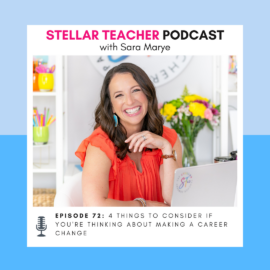
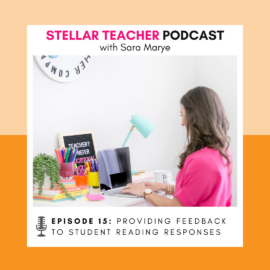
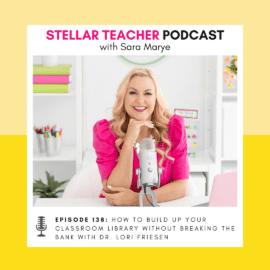
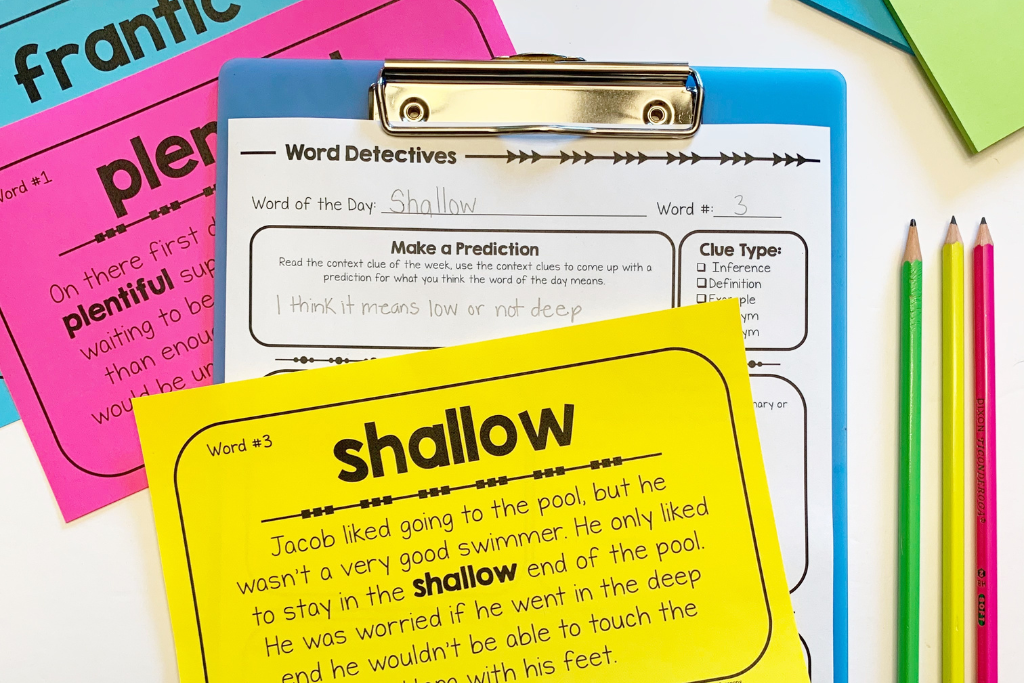

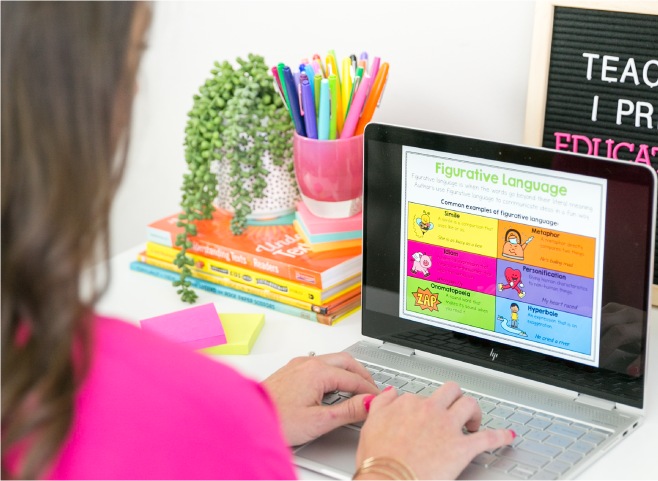
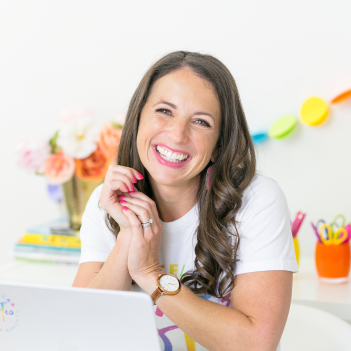
Leave a Comment
You must be logged in to post a comment.